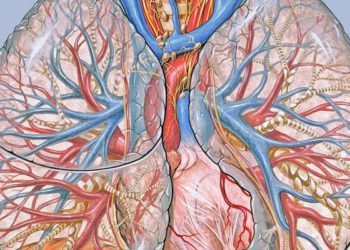Mirikizumab induces clinical remission in patients with ulcerative colitis
1. In this randomized controlled trial, patients with ulcerative colitis taking mirikizumab had higher rates of clinical remission compared to those taking a placebo.
2. Opportunistic infections occurred more frequently in the mirikizumab group.
Evidence Rating Level: 1 (Excellent)
Study Rundown: Recent clinical trials and approval of monoclonal antibody treatments for ulcerative colitis suggest interleukin-23 as a promising therapeutic target. Mirikizumab is a humanized monoclonal antibody that binds a subunit of interleukin-23. In this study, two phase three trials evaluating the efficacy of mirikizumab induction and maintenance for adult patients with moderate to severe treatment-resistant ulcerative colitis were reported. In the induction trial, patients received intravenous mirikizumab or placebo every four weeks for 12 weeks. In the maintenance trial, patients with clinical response to mirikizumab during the induction trial underwent randomization again to receive blinded subcutaneous mirikizumab or placebo every four weeks over an additional 40 weeks. The primary outcome was clinical remission at week 12 for the induction trial and week 40 for the maintenance trial. A significantly higher percentage of patients in the mirikizumab group achieved the primary outcome for both the induction and maintenance trials. Secondary outcomes in the induction trial were endoscopic remission, clinical response in patients with previous treatment failure, histologic-endoscopic mucosal improvement, and bowel-movement urgency. Secondary outcomes were superior in the mirikizumab group. For safety, the incidence of opportunistic infection and immediate hypersensitivity reactions was more frequent in the mirikizumab group. As a limitation, less than 1% of patients in each trial were Black, which may lead to lower generalizability of the study. Overall, mirikizumab improved remission in ulcerative colitis patients.
Click to read the study in NEJM
In-Depth [randomized controlled trial]: In this study, two phase three trials evaluating the efficacy of mirikizumab induction and maintenance for adult patients with moderate to severe treatment-resistant ulcerative colitis (n=1,162) were reported. In the induction trial, patients were randomly assigned to receive mirikizumab 300mg (n=868) or a placebo (n=294) every four weeks for 12 weeks. In the maintenance trial, 544 patients with clinical responses to mirikizumab were randomly assigned to receive mirikizumab 200mg (n=365) or placebo (n=179) every four weeks for 40 weeks. In the induction trial, the primary outcome of clinical remission at week 12 was significantly higher in the mirikizumab group than in the placebo group (24.2% and 13.3%, respectively; difference, 11.1 percentage points; 99.875% Confidence Interval [CI], 3.2 to 19.1; p<0.001). The primary outcome in the maintenance trial of clinical remission at week 40 was significantly higher in the mirikizumab group than in the placebo group (49.9% and 25.1%, respectively; difference, 23.2 percentage points; 95% CI, 15.2 to 31.2; p<0.001). Secondary outcomes in the induction trial of endoscopic remission, clinical response in patients with previous treatment failure with a biologic agent or tofacitinib, histologic-endoscopic mucosal improvement, and bowel-movement urgency were significantly superior in the mirikizumab group (p<0.001 for all comparisons). Secondary outcomes in the maintenance trial of glucocorticoid-free clinical remission, endoscopic remission, histologic remission, and bowel remission were significantly greater in the mirikizumab group (p<0.001 for all comparisons). For safety, the incidence of opportunistic infection and immediate hypersensitivity reactions were more frequent in the mirikizumab group. In summary, mirikizumab therapy was efficacious in both the induction and maintenance of remission in patients with ulcerative colitis.
Image: PD
©2023 2 Minute Medicine, Inc. All rights reserved. No works may be reproduced without expressed written consent from 2 Minute Medicine, Inc. Inquire about licensing here. No article should be construed as medical advice and is not intended as such by the authors or by 2 Minute Medicine, Inc.






